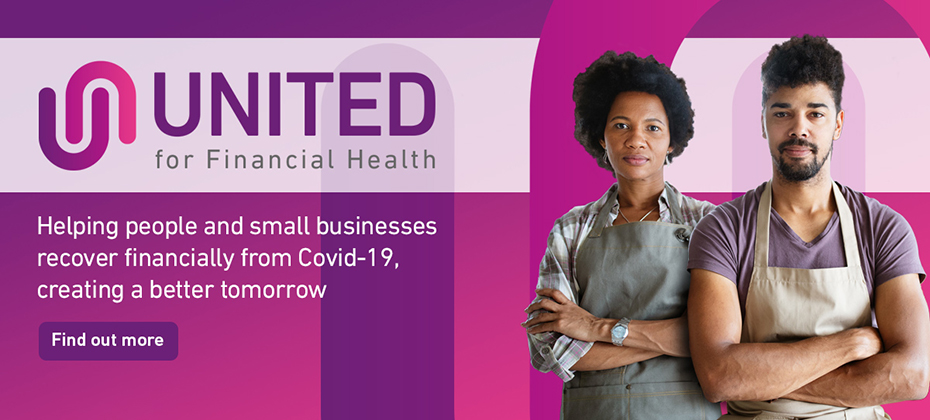Search Results for: covid-19

At Experian, we create a better tomorrow by powering opportunities for consumers, customers, our people and communities. We use the full range of our capabilities to drive financial education and inclusion, and one of the ways we do this is through our United for Financial Health programme. I am delighted to announce the launch of this important programme in two of EMEA’s markets today. We’re excited for the positive difference our two new partnerships will make to help vulnerable consumers financially recover from the impacts of Covid-19. In Italy, incidents of domestic violence have increased considerably during the global pandemic, with the Italian National Institute of Statistics reporting a 75% increase in calls to anti-violence helplines in 2020 alone. Further statistics show women are particularly affected by unemployment due to Covid-19, reducing victims’ financial independence and their ability to escape from situations of abuse. The increase in domestic violence since the onset of the pandemic has also been highlighted globally by the UN. To help those impacted, we intend to partner with MicroLab and Microfinanza, who support women victims of domestic violence, foreign caregivers, and young people not in employment, education or training (NEETs). Our partnership aims to help these people access credit, so they have the financial means to improve their current situation, and take steps toward creating a better tomorrow. We will collaborate to deliver financial education, and we intend to develop an app that captures open (non-traditional) financial data to help them build their credit profiles. In South Africa, unemployment stands at 32.6%. A large proportion of people in the country run or work for small to medium-size enterprises (SMEs). By helping these organisations access affordable credit so they can continue to operate through the pandemic, we believe we can have a tangible impact on people’s employment. We will partner with the National Small Business Chamber, a non-profit membership organisation that supports SMEs. Together, we will educate small business owners on their financial and credit health, empowering them to improve their personal and business credit profiles to access the funding required to maintain and grow their businesses. Combined, we estimate our partnership with our NGO partners will reach 3.8 million consumers, helping deliver on our Company’s commitment to reach 100 million people by 2024. We start work on these projects today on our path to creating a better tomorrow.

Every week, we talk about important data and analytics topics with data science leaders from around the world. You can subscribe to the DataTalk podcast on iTunes, Google Play, Stitcher, SoundCloud, and Spotify. DataTalk features data science leaders at MIT, Caltech, United Nations, Gartner, Twitter, Salesforce, Amazon, UBER, IBM, LinkedIn, Spotify, Dow Jones, and dozens of other startups and top data companies. In this week’s #DataTalk, we welcome back Dr. Gleb Tsipursky, CEO of Disaster Avoidance Experts, a consulting firm that empowers leaders and organizations to avoid business disasters. Dr. Tsipursky talks to us about the concept of adopting a hybrid model when returning to the office as COVID-19 comes to a gradual end. He also discusses the ways leaders should strategically address challenges related to working from home, and the different biases these leaders may face. You can check out his latest book, Returning to the Office and Leading Hybrid and Remote Teams: A Manual on Benchmarking to Best Practices for Competitive Advantage, to learn more about Dr. Tsipursky's hybrid-first approach for returning to the office. Video Highlights from the Conversation: Challenges Faced While Working During COVID-19 Adopting a Hybrid Work Model The Future of Workspaces Benefits of a Hybrid Work Model Challenges Ahead for Leaders This show is hosted by Destiny White and Mike Delgado. Please reach out with suggestions for future topics or guests. You can also catch the full video interview here. About Dr. Gleb Tsipursky Dr. Gleb Tsipursky is an internationally renowned thought leader in future-proofing and cognitive bias risk management. He serves as the CEO of the boutique future-proofing consultancy Disaster Avoidance Experts, which specializes in helping forward-looking leaders avoid dangerous threats and missed opportunities. A best-selling author, he wrote Never Go With Your Gut: How Pioneering Leaders Make the Best Decisions and Avoid Business Disasters (Career Press, 2019), The Blindspots Between Us: How to Overcome Unconscious Cognitive Bias and Build Better Relationships (New Harbinger, 2020), and Resilience: Adapt and Plan for the New Abnormal of the COVID-19 Coronavirus Pandemic (Changemakers Books, 2020). His writing was translated into Chinese, Korean, German, Russian, Polish, and other languages. His cutting-edge thought leadership was featured in over 550 articles and 450 interviews in prominent venues. They include Fortune, USA Today, Inc. Magazine, CBS News, Time, Business Insider, Government Executive, The Chronicle of Philanthropy, Fast Company, and elsewhere. His expertise comes from over 20 years of consulting, coaching, and speaking, and training for mid-size and large organizations ranging from Aflac to Xerox. It also comes from his research background as a behavioral scientist with over 15 years in academia, including 7 as a professor at Ohio State University. Contact him, follow him on LinkedIn, Twitter @gleb_tsipursky, Instagram @dr_gleb_tsipursky, Medium @dr_gleb_tsipursky, Facebook, YouTube, and RSS, and get a free copy of the Assessment on Dangerous Judgment Errors in the Workplace by signing up for his free Wise Decision Maker Course.

Our weekly #CreditChat started in 2012 to help our community learn about credit and important personal finance topics (e.g. saving money, paying down debt, improving credit scores). Each chat is hosted by @Experian on Twitter and all are welcome to participate. DM us any questions. This week, we’ll provide money tips as pandemic restrictions begin to lift. Topic: Protecting and Maintaining Your Finances As We Emerge From COVID-19 When: Wednesday, June 9, 2021 at 3 p.m. ET. Where: Twitter chatroom or join the live hashtag discussion. The panel will include Laura J. LaTourette, CFP®: Founder of Family Wealth Management Group; Take Charge America; Leslie H. Tayne, Esq: Founder and Managing Director of Tayne Law Group, P.C. (f/k/a The Law Offices of Leslie H. Tayne, P.C.); Beverly Harzog: Credit Card Expert and Consumer Finance Analyst for U.S. News; Lawrence D. Sprung: CFP® President of Mitlin Financial, Inc.; Paulina Likos: Investing Reporter at U.S. News; Rod Griffin: Senior Director, Consumer Education and Advocacy, Experian and Christina Roman: Consumer Education and Advocacy Manager at Experian. Gift Card Giveaway Enter here for a chance to win a $50 Amazon gift card! We will be announcing a winner at the end of the chat. Entry Period: Raffle open now and closes at the end of this chat at 4 p.m. ET. Complete rules here. Questions We’ll Discuss: What should you think about with regard to your finances as we emerge from COVID? Were you prepared for the financial volatility created by the pandemic? If not, what changes can you make now to ensure that you are better prepared for future emergencies? Did you develop financial habits during the pandemic that you would like to keep? Did you develop any financial habits during the pandemic that you should break? What should you consider when taking inventory of your financial portfolio as we emerge from the pandemic? How do you budget as financial relief accommodations begin to expire after the pandemic? How do you resist the temptation to overspend when celebrating with friends and family? How do you create financial safety nets or emergency funds that will help you navigate future crises? How can investing contribute to your financial security in the event of future emergencies? What are the implications of using your credit more as we emerge from COVID-19? How do you need to think differently about protecting your identity now that we are resuming in-person shopping/dining etc.? Check out our complete list of upcoming personal finance Twitter chats here.

Listen (or download) the podcast: Every week, we talk about important data and analytics topics with data science leaders from around the world. You can subscribe to the DataTalk podcast on iTunes, Google Play, Stitcher, SoundCloud, and Spotify. DataTalk features data science leaders at MIT, Caltech, United Nations, Gartner, Twitter, Salesforce, Amazon, UBER, IBM, LinkedIn, Spotify, Dow Jones, and dozens of other startups and top data companies. In this week's #DataTalk, we chat with Dr. Djamila Amimer, founder of Mind Senses Global, about trends in artificial intelligence during the age of COVID-19, challenges in the global supply chain, recommendations for data scientists, and recent achievements in A.I. During our conversation, Dr. Djamila Amimer also dispels common misconceptions, myths, and fears surrounding artificial intelligence. Video Highlights from the Conversation: A.I. Projects During COVID-19 Future Trends in A.I. Challenges in the Supply Chain Recent Achievements in A.I. GPT-3 Development & Racial Bias Moral and Ethical Judgments in A.I. Future Trends for Women in the Workforce A.I. and Combatting COVID-19 This show is hosted by Destiny White and Mike Delgado. Please reach out with suggestions for future topics or guests. You can also catch the full video interview here. About Dr. Djamila Amimer Dr. Djamila Amimer is the founder and CEO of Mind Senses Global, a management consultancy that helps businesses and organizations integrate the use of Artificial Intelligence (AI) into their decision-making. She graduated from the University of Dundee with a Ph.D. in Artificial Intelligence and Energy Economics. She is a business leader with a broad range of experiences across AI, machine learning, commercial deals, business strategy, energy, supply chain, shipping & trading, business resilience, and climate change. Djamila has developed frameworks and novel AI techniques in the area of investment decisions dealing with uncertainty in project evaluation. She is passionate about artificial intelligence and would like to make it accessible to everyone.

We recognize that COVID-19 has challenged Americans across the country, and nearly a year later, people are still struggling to recover. Among the more pressing issues for people has been navigating the financial landscape and hardships brought on by illness and high unemployment rates. At Experian, we empathize with consumers and are committed to helping them manage their financial lives. As part of this commitment, Experian, along with the other U.S. credit reporting agencies, is continuing to offer free weekly credit reports to all Americans for an additional year via AnnualCreditReport.com. At Experian, we view ourselves as the consumers’ bureau, and aim to help people better position themselves as they recover from COVID-related hardships. We’re proud of our ongoing efforts to assist consumers, particularly during these difficult times. Financial and credit information is constantly updated, and we believe providing consumers with increased access to their credit reports will help them improve their financial health, monitor for lender updates and ensure there is no fraudulent or unfamiliar activity on their credit profiles. We are committed to helping facilitate access to fair and affordable access to credit for all consumers. Our goal is not only to help consumers build credit, but also to effectively manage it. Beyond our continued offering of free credit reports, consumers can access resources and educational materials to help learn about credit and other important personal finance topics. In fact, we recently launched our United for Financial Health project to empower vulnerable populations to improve their financial health through education and action. We’re continually exploring new ways to use our data and resources to empower consumers and to improve their financial health and recover from COVID-19; extending access to free weekly credit reports is just another step in that process.

A year ago, we shifted our business to remote working as the global pandemic took hold. Like the rest of the world, we had no idea how long we’d be away, but we didn’t really imagine we’d still be operating our business with a remote workforce a year later. What a year it has been. It is incredible to look back and reflect on how our lives have changed, how we were able to adapt to this new way of living and working, and really importantly, how we were able to keep innovating to help communities and businesses during this difficult time. We have captured highlights of our work and efforts in our North America annual diversity and inclusion report, 2020 Power of YOU. At Experian, the safety and well-being of our colleagues has consistently been a top priority. As such, we have been able to focus on serving consumers and clients when and where they need help the most. As a company, we expanded our benefits to take care of our employees. Coworkers jumped in to take care of each other. Our employee resource group dedicated to mental health and caregiving partnered with colleagues to create a dynamic set of tools and guides tackling different topics every week through webinars, articles and personal, candid videos from leaders. We supported each other during times of social unrest. We celebrated progress in growing our business. We logged 18,000 volunteer hours to increase financial inclusion, support frontline healthcare workers, honor active duty military and veterans, and fight hunger in underprivileged communities. We leveraged our diversity of perspectives, backgrounds and experiences to help vulnerable populations in crisis from COVID-19, including launching our United for Financial Health program. We remain steadfast and committed to equity for all. We are proud to start the new year with this wonderful look back at last year, propelling us forward to more opportunities to innovate and serve. We invite you to check out the 2020 Power of YOU Report here.

While there is no question the pandemic continues to create a challenging financial situation for millions of consumers, this is not the case for everyone. Because Americans are finding themselves in unique financial situations, there is not a one size fits all solution for maintaining access to the credit economy. As 2020 comes to a close and U.S. consumers and businesses grapple with another surge in COVID-19 cases, it is critical for the credit services industry to continually recognize and assess the impact the pandemic is having on consumer’s financial health. At Experian, our role is to help lenders understand consumer’s unique circumstances, so they know who they are talking to and what risk an applicant represents at any given time. We use the power of data, including traditional credit data, alternative data and consumer permissioned data, to accomplish this objective. I was recently invited to speak with Cheddar’s Nora Ali to share my views on the Road to Recovery from the pandemic, how we can maintain access to the credit economy and ways consumers can protect their credit standing and financial health during this time. You can watch the full interview here. I believe data is key to maintaining access to the credit economy and protecting consumer financial health, especially in environments like the one we currently find ourselves in.

If you’re anything like me, you’re likely spending much more time online these days. From online shopping to grocery and food delivery and thumbing through our social media feeds – the COVID-19 pandemic has many of us spending more time in our homes and “plugged in” than ever before. The COVID-19 pandemic has also contributed to an increase in fraud activity. According to the FTC from January to early October 2020, consumers have reported losing a total of more than $156 million to COVID-19-related fraud. At Experian, we are committed to protecting consumer financial health during the pandemic and beyond. Educating consumers about how to protect their personal information online is key to supporting this effort. As we prepare to enter the holiday season in our virtual world and in honor of National Cybersecurity Awareness Month, I’d like to share a few ways you can protect your financial health online: Shop Safely Online As I mentioned, the amount of shopping you do online has likely increased significantly since the start of the COVID-19 pandemic. This is a trend that’s expected to continue. In fact, according to a recent report from Experian, as many as half of consumers globally expect their spending online to increase in the next 12 months. Practicing safe online shopping habits is always important. This is especially true now. While you may not be spending as much time in airports or your local coffee shops, it is a good practice to avoiding using your financial information to make purchases online if you are on a public WiFi network. Without a password protected network, you have a higher risk of fraudsters gaining access to your banking information which could significantly damage your financial health. Using a virtual private network or a VPN can be an added layer of protection when you are entering your financial information online. Using a credit card to make your online purchases is also a useful way to protect yourself against losses tied to fraudulent charges. According to the federal Fair Credit Billing Act if your credit card — the physical card — is stolen and used to make fraudulent purchases, your issuer can hold you responsible for up to $50 in fraudulent charges. However, if you report the card stolen before any fraudulent charges are made, you have no liability. If your card number is stolen but you’re still in possession of the card, you’re not responsible for any fraudulent charges. Avoid Falling for Phishing Emails Phishing is an attempt to obtain sensitive information for criminal and fraudulent purposes through email. Against the backdrop of the pandemic, there have been increased reports of phishing attempts around COVID-19 testing, vaccines, treatments and cures. Keep in mind that generally if something sounds too good to be true, it likely is. To prevent damage to your identity or your financial health avoid opening any suspected phishing emails and never click on included links. While phishing emails are getting more sophisticated, there are a few clues that can help you identify one in your inbox. If you receive a suspicious looking email, look at the sender name or email address. Phishing emails tend to have suspicious email addresses that are often different than the name of the sender (it could be anything from a slight misspelling of the senders name to an email address that is completely different). It’s also common for phishing emails to use urgent language and include unusual attachments or links. While reputable organizations may sometimes ask for personal information over email, pay close attention to the details of the email before sharing any of your information. It may be a better idea to call the requesting organization and find out if there is a more secure way to do whatever it is they may be requesting. Always think twice before clicking any links. When in doubt, type the organization’s name into an internet search and visit the site directly. Protect Your Passwords This is a basic point, but one that is commonly overlooked. Using complex passwords can be your first line of defense against potential cyber threats. I know it can be challenging but avoid using the same password for multiple online accounts. When you’re creating unique passwords, it’s best to include a minimum of eight characters with a variety of letters, numbers and symbols. Keeping track of your passwords for your online bank accounts, email, social media, shopping apps and online medical portals can be a lot to manage. A password manager subscription can be a convenient and secure way to manage your passwords. They are affordable and more secure than writing down all your passwords or using the same password for multiple accounts. Avoid Over Sharing on Social Media Oversharing on social can lead to unwanted implications. For example, fraudsters and criminals can learn a lot about you from the data included in the photos you share online, including where you are and when you are there. Avoid photos of items that can be used to determine more information about you such as your license plate or the front of your home. Keep in mind, that while it may be tempting to share photos of your family vacations on your social networks, this may also tell unwanted visitors that you are not home. Use tools to Combat Fraudsters Checking your credit report regularly can help you stay informed about potentially fraudulent activity. In an effort to encourage consumers to monitor and understand the information in their credit reports, Experian joined forces with the other U.S. credit reporting agencies, to offer free weekly credit reports to all Americans through April 2021 via www.annualcredreport.com. Credit monitoring services can help you spot potential fraud early. Experian offers free and paid services that provide daily credit monitoring alerts for things like new inquiries and accounts opened in your name, changes to your personal information and suspicious activity detected on your Experian credit report. You can find more National Cybersecurity Awareness Month resources to protect yourself online here.

Join our #CreditChat on Twitter every Wednesday at 3 p.m. ET. This week we talked about ways you can earn extra money during COVID-19. The panel included Rod Griffin: Senior Director, Consumer Education and Advocacy, Experian; Christina Roman: Consumer Education and Advocacy Manager at Experian; Forbes Advisor; Beverly Harzog: Credit Card Expert and Consumer Finance Analyst for U.S. News; Paulina Likos: Investing Reporter at U.S. News; Take Charge America; Lawrence D. Sprung: CFP® President of Mitlin Financial, Inc; Dr. Barbara O’Neill: Owner/CEO of Money Talk; LaToya Irby: Credit Expert and Personal Finance Blogger; Patrina Dixon: Certified Financial Educator; and Leslie H. Tayne, Esq: Founder and Managing Director of Tayne Law Group, P.C. (f/k/a The Law Offices of Leslie H. Tayne, P.C.). Questions We Discussed: Q1: Where can you find gigs and part-time work to earn extra money? Q2: What are some temporary jobs in high demand during the coronavirus pandemic? Q3: What are some job hunting scams to look out for and how can you protect yourself? Q4: What are some creative ways to make money online? Q5: What are some side hustles you can start while social distancing? Q6: Where and how can sell your stuff online? Q7: What are some ways to make extra cash renting out your stuff? Q8: What's the best cashback apps to score rewards for shopping and groceries? Q9: Where can you find financial resources for workers and businesses affected by coronavirus? Q10: Any final tips on how to earn some extra cash during COVID-19? Retweet these insights from our community: A1. “Pandemic pets” are a trend right now, but before adopting, consider that pets are a long-term financial commitment. Be certain that you can take care of all of pet’s needs, including their medical bills. #CreditChat — Jennifer White (@Jennifer_Wwhite) October 28, 2020 A2: Many factors are at play when figuring out how much it’ll cost to adopt a pet, including: the pet’s age, if vaccinations are required, spay/ neuter fees and the shelter. Expect to pay anywhere from $75-350. #CreditChat — Leslie H. Tayne, Esq (@LeslieHTayneEsq) October 28, 2020 A3: For a new puppy, you definitely want to invest in: - dog food - collar - leash - toys - crate to keep it safe - shampoo and grooming tools #creditchat pic.twitter.com/5N52EbIbr9 — Kembala Evans (@Kembala) October 28, 2020 A4. Food as well at veterinary care, also keep in mind the animal could get sick so make sure to have extra money set aside just in case. depending on the breed grooming can be an ongoing expense #CreditChat — Larry Sprung, CFP® (@Lawrence_Sprung) October 28, 2020 A5: If you can, groom your pet on your own. For food, if you order online you might be able to set up autoship to save money. #creditchat — Ashley Jacobs (@collegecents) October 28, 2020 A6. I would budget at least $1,000 per pet, if you want to avoid taking out debt. A recent @LendingTree survey found that only a quarter of pet owners could pay for a $1,000 emergency vet expense in cash! #CreditChat pic.twitter.com/4B3F0F8asF — Erika Giovanetti (@erikaxgio) October 28, 2020 A7. Like all insurance, you’re gambling on what *might* happen. If you’re adopting an older pet or one with known health issues, pet insurance can definitely end up paying for itself and the some. #creditchat — Take Charge America (@TCAsolutions) October 28, 2020 A7: Pet insurance doesn’t cover pets with pre-existing conditions, and if you adopt a senior pet, they might not be covered. Premiums are about $534 a year for dogs and $335 for cats. You might be better off putting that money in an emergency fund. #CreditChat — American Consumer Credit Counseling (@ACCC_TalkCents) October 28, 2020 A7: An in-depth look at the pros & cons of pet insurance from @Investopedia. #CreditChat https://t.co/tF32lbDgFn — Beverly Harzog (@BeverlyHarzog) October 28, 2020 A8: If you’re flying with pets, on average, it costs between $100-$125 to bring your dog or cat in the cabin. Keep in mind, their carrier will need to be up to the airline’s standards, so you may have to buy a new one for air travel. #CreditChat pic.twitter.com/eSr2Qklr9e — American Consumer Credit Counseling (@ACCC_TalkCents) October 28, 2020 A9: Start a pet-sitting business or walk dogs for neighbors who aren't home during the day, volunteer in a shelter, train service dogs or foster pets. Or start off with just one goldfish. :) #CreditChat — Beverly Harzog (@BeverlyHarzog) October 28, 2020 A10 Just because Pets are cute and furry doesn't mean you should just adopt them. Make sure you are financially stable and can give time, tender, love, and care. They need it! #CreditChat — * Ming Chan * (@mingfaichan) October 28, 2020 A10: Do your research on fees and typical expenses for the type of animal you’re looking to adopt. Many people don’t realize how expensive a pet can be & end up back in shelters as adults, less likely to be adopted. #CreditChat — Leslie H. Tayne, Esq (@LeslieHTayneEsq) October 28, 2020 A10: Do your research on fees and typical expenses for the type of animal you’re looking to adopt. Many people don’t realize how expensive a pet can be & end up back in shelters as adults, less likely to be adopted. #CreditChat — Leslie H. Tayne, Esq (@LeslieHTayneEsq) October 28, 2020